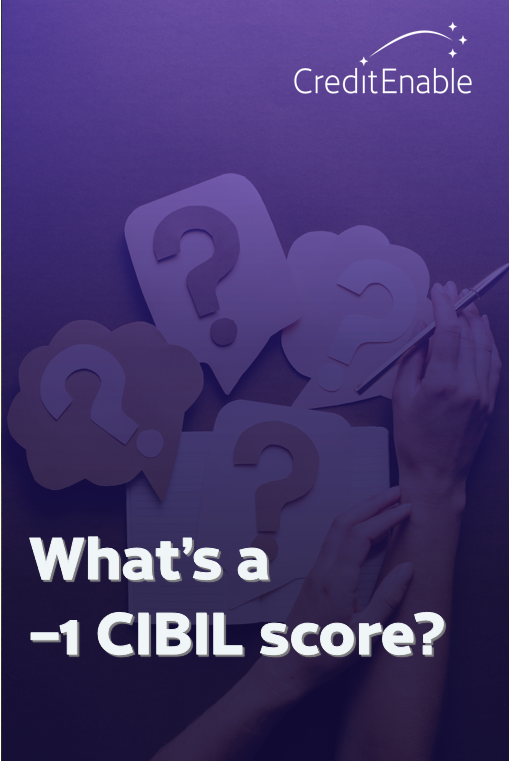
You have a -1 (minus 1) CIBIL score or credit score if you’re a first-time borrower applying with a formal lender or someone who does not have any credit history (loans or credit cards).
But what does a -1 credit score mean for your prospects of getting an SME loan from a formal lender? Let’s find out.
What does a -1 CIBIL score (credit score) mean?
If you have a -1 credit score, it means the credit bureaus in India have no repayment history associated with your Permanent Account Number (PAN). You’ve never borrowed a loan or gotten a credit card from a bank or an NBFC in India, therefore there is no recorded financial history to base your CIBIL score (credit score) on.
There is no need to worry, as a -1 CIBIL score does not mean you are not creditworthy. It simply means no lender has ever lent to you, so the credit bureaus do not yet know how you manage money, so they cannot calculate a 3-digit credit score to assign to you.
This is usually the case with young businesses or SMEs who have so far only invested their own capital into their firms, so they have not yet had to approach a formal lender for a business loan.
Do I qualify for an SME loan if my CIBIL score (credit score) is -1?
Yes, some lenders will lend you a business loan even if your credit score is -1. The type of loan you qualify for will be an Unsecured Business Loan.
Since another lender or credit bureau has never vetted your credit behaviour, the loan amount the lender may offer you will be less, along with a shorter loan repayment period and a comparatively higher interest rate. This is to help the lender minimize the risk they take on when lending without any collateral.
In case of a -1 CIBIL score, lenders will base their lending decision on the following:
- Business health: Your business transactions and average bank account balance show that your business is doing well.
- No cheque bounces: Your business is not in a cash crunch.
- Business vintage: Your business has a vintage of at least 2 years, meaning your business has been registered and operational for at least 2 years.
- Business registration: You can provide the lender with legal business registration proof to verify your business vintage.
- Property ownership: You can provide the lender proof of residential or commercial property ownership.
The ownership requirement does not mean you need to put that asset up as collateral for the business loan. The lender only asks for this to have more comfort and faith in your business and business plan. It indicates to the lender that your business plan is sound and that you can turn enough profit to purchase assets.
Why does my credit score matter when I apply for an SME loan?
A credit score is a 3-figure value assigned to an individual or a business by a credit bureau based on your credit history. It can range from 300 – 900. Lenders use your credit score as an indicator of your creditworthiness when deciding to lend to you. The closer your score is to 900, the better your chances of getting the SME loan you need.
Does my CIBIL score or credit score change?
If you have a credit history, CreditEnable SME customers require a minimum credit score of at least 750 to qualify for a business loan with one of our lender partners. If you’ve never borrowed before and your CIBIL score or credit score is -1, some of our lender partners will still be able to lend to you.
When you apply for an SME loan CreditEnable, we do a soft pull of your Experian credit score to check your eligibility for a business loan. This soft pull has zero impact on your credit report and helps us tell you upfront whether you qualify for a business loan with one of our lender partners.
Start my SME loan application with CreditEnable.
Business Loans. Enabled Simply.
